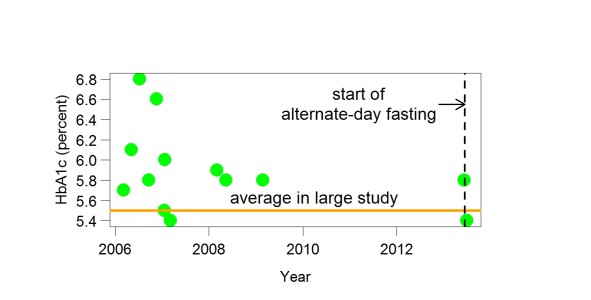In 2012 I posted about using “magic dots” to get work done. You make a mark on a piece of paper every six minutes you work. The idea derives from the quasi-reinforcement effect of Neuringer and Chung. They found that giving pigeons markers of progress toward food, such as a blackout, doubled how much the pigeons pecked for food — that is, doubled how much they worked.
I found magic dots very helpful. The future will be different from the past was my reaction. (In the future I will get more work done.) So did a reader named Joan. Now a reader named David Johnston tells his experience:
I’m an engineer designing cryptographic digital circuits in microprocessors, which is intellectually challenging but also involves a lot of coding and debugging which requires concentration and attention to detail but is certainly not intellectually challenging. My specialization is random numbers, which even by computer science standards is a very narrow and deep field to specialize in. I don’t know of anyone else who does what I do. My work environment is saturated with sources of interruption which very much gets in the way of getting work done. If you think my employer is getting something wrong in creating an effective workplace for engineers, you would be correct. Procrastination is a big issue for me and I’ve tried various approaches to focus better without great success except for the Japanese music thing described below.
So after reading your article I gave it a try, I set up a timer on my computer (Orzeszek Timer) to beep every six minutes and filled out the dots on each beep.
On my first pass I lasted 2.5 hours before I had a meeting to go to and completed a detailed technical diagram of a circuit I was proposing. The next day I did 5 hours (with a lunch break in between) and was coding up the circuit. I stopped due to a meeting and could have continued. The third day I did not get a chance to focus on code or design, so I managed 0 hours. Then the weekend happened.
This is very much not normal for me. I might do 30 minutes to 1 hour before feeling the need to do something else besides concentrating, like dealing with email or getting a coffee. Getting back to it is not an efficient process since you are typically juggling multiple facts (aka the ‘working set’) pertinent to the problem and getting back in that frame of mind takes time. This is well a well documented aspect of computer programming, where there is a warm up time before the programmer becomes productive and then the productive period is fragile and easily set back to the start by interruptions.
I intend to keep trying this method and I hope it proves to be effective over longer periods because succeeding at my job is a lot less stressful than not succeeding. Obviously the vanishingly small investment required to try it is a big factor in making it easy to choose to try it.
So my initial reaction is that it works. My sense is that there is something important about mentally breaking up progress into chunks. I certainly do that on long tasks, e.g. a long drive ( I might envision it as passing the 10%, 20% etc points as we progress) or recently a game (Ingress – a game you play with a smartphone that requires you get out and walk a lot) where the space between levels doubles. To get to the final level 8 from 7 requires 600,000 points to reach 1.2 million total. Logic would suggest you should just head out and get all the points you can as fast as possible, but that is disheartening because any one day doesn’t make a big dent. By setting a goal of 10,000 per day, that gave me a mental and physical framework that was effective. I knew when to keep going (less than 10,000 points achieved) and I knew when to stop (at 10,000 points and probably 2 miles walking). Roughly 60 days later I got to the highest level.
While working on design, the beep in my ear and reaching to draw a dot or line on graph paper was not enough to knock off my concentration, but the continuing for the next six minutes felt like an achievable goal, much like 10,000 points in Ingress felt like an achievable goal each day, whereas choosing to sit and concentrate for five hours is a non starter, much as trying to battle through 600,000 points in Ingress is a non starter.
Possibly unrelated, but maybe not – I have found that I work well listening to Japanese music on headphones (e.g. Happy End or Tokyo Jihen). I haven’t a clue what the words are and so it seems to not interrupt my coding state of mind in the same way that English language music does. The cadence (3-6 minutes per song) is not that far off the quasi-reinforcement time of 6 minutes that was suggested on your website. Also it blocks out the blathering of people near me in the office. I presume it being Japanese has nothing to do with its efficacy. It is just a language that hits zero of my language processing neurons. Any language would do if the music was good.
If you find the magic dots don’t work for you, I am just as happy to hear about it.
